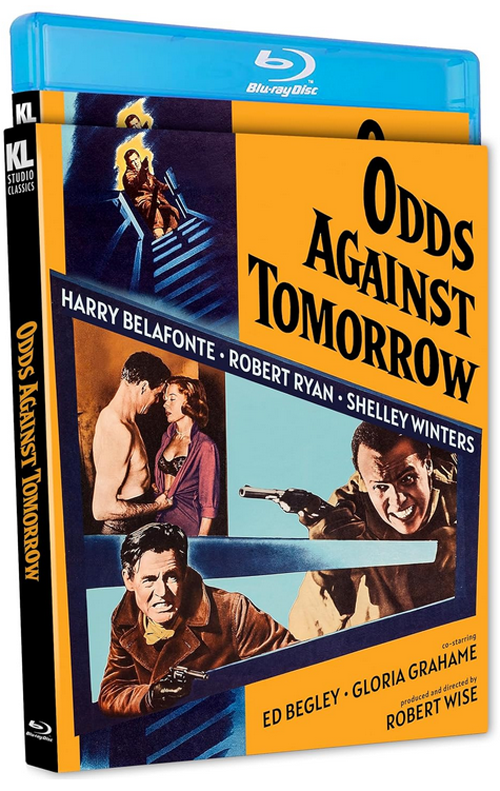
“A CAPER IN WHITE… AND BLACK”
By Raymond Benson
The
film noir movement/trend in Hollywood was fading away by the end of the
1950s decade. Orson Welles’ Touch of Evil (1958) is often cited by film
historians and film noir aficionados as the “last true film noir.”
However, one picture released in 1959 could very well take that honor,
for it indeed exhibits many of the traits of pure film noir (black and
white photography, gritty realism, cynical and edgy characters, a heist,
and an ending that is, well, not a happy one).
Odds
Against Tomorrow was set up by actor and musician Harry Belafonte and
was made by his production company. Is it the first film noir with a
Black protagonist? This reviewer can’t think of another that preceded
it. Basing it on a novel by William P. McGivern, Belafonte hired
blacklisted Abraham Polonsky to write the screenplay. Polonsky (who had
written the great Body and Soul, 1947) had been caught up in the HUAC
investigations in Hollywood, refused to testify in the hearings, and was
subsequently blacklisted along with many other writers, producers,
directors, and actors. Polonsky, working with co-writer Nelson Gidding,
wrote the script under a front-pseudonym, John O. Killens, a living
Black novelist. It wasn’t until 1996 that the Writers Guild restored
Polonsky’s real name to the credits.
Belafonte
apparently had wanted to make a movie that was not only a gripping heist
drama but also a statement about prejudice. Of the trio of robbers who
attempt a bank robbery in the film, one is Black (Belafonte), the other
two are White, and one of the latter is terribly racist… a factor that
plays into how the caper ultimately plays out.
New York
City. Dave Burke (Ed Begley) is a disgraced former cop who needs money.
Earl Slater (Robert Ryan) is an embittered, racist war veteran and
ex-con who needs money. Johnny Ingram (Belafonte) is a musician in debt
to a gangster because of a gambling addiction, so he needs money, too.
Slater lives with needy Lorry (Shelley Winters, in one of her whiny
roles) but he has the hots for apartment building neighbor Helen (Gloria
Grahame). Johnny is separated from his wife, Ruth (Kim Hamilton) and
daughter Edie, but he desperately wants to make good and reunite the
family. When Dave learns about an upstate smalltown bank with a
vulnerability, he enlists Earl and Johnny in a scheme to steal $150,000,
split three ways. Johnny doesn’t want to do it, but the pressure from
the mobster and threats to his family force him into it. Earl is not
happy that a Black man is part of the plan, and this tension is a major
conflict in the heist proceedings. To reveal more would spoil the
excitement.
Robert Wise, a filmmaker who seemed to be
able to make a great film out of any genre, is at the helm, and he does a
terrific job. He had worked with Ryan before in the film noir, The
Set-Up (1949). Wise, of course, won Oscars for directing The Sound of
Music (1965) and co-directing West Side Story (1961), but also made such
diverse classics as The Day the Earth Stood Still (1951), The Haunting
(1963), and Star Trek: The Motion Picture (1979)!
This
is an intense, engaging picture that generates suspense and has
something to say. The script is top-notch, and the performances are
heightened just enough to fit firmly into the film noir style. The
music, composed by John Lewis and performed by the Modern Jazz Quartet,
is phenomenally good, adding another level to the tone and feel of the
movie.
Kino Lorber Studio Classics’ new Blu-ray
presentation is sharp and clean in glorious black and white. There is an
accompanying audio commentary by author/film historian Alan K. Rode.
Supplements include Post Screening Q&A interviews with Harry
Belafonte (in 2009) and Kim Hamilton (in 2007), plus the theatrical
trailer for this and other Kino Lorber film noir titles.
Odds
Against Tomorrow is for fans of film noir, heist movies, Robert Wise,
Harry Belafonte, Robert Ryan, and other members of the sparkling cast.
Highly recommended.
Click here to order from Amazon